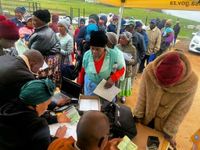The South African Social Security Agency (SASSA) has officially confirmed the Child Support Grant dates for the rest of 2025, providing millions of households across South Africa with critical information for financial and family planning. Whether you’re a parent, caregiver, social worker, or professional in community services, understanding these dates is essential. Reliable access to this grant ensures children receive the consistent care, education, and nutrition they need to thrive.
The Child Support Grant (CSG) continues to be one of the most widely utilized social assistance programs in the country. As of early 2025, more than 13 million children benefit from this vital support, according to SASSA. Confirming the grant payment schedule for the remainder of the year brings reassurance and structure to families who rely on it for day-to-day living.
The confirmed payment schedule for the Child Support Grant is as follows:
The SASSA Child Support Grant plays a vital role in the lives of millions of South African families. By confirming the 2025 payment dates, SASSA has empowered caregivers with the knowledge they need to ensure stability and well-being for their children. From providing nutrition to supporting education, this grant is a cornerstone of child development and social equity.
The Child Support Grant is a monthly financial assistance program initiated by the South African government to aid families with limited income. It is designed to reduce child poverty and improve the health, education, and overall well-being of children under the age of 18. As of 2025, the grant provides R530 per child, per month. For families with multiple children, the grant can significantly enhance the household’s ability to provide for basic needs like food, school uniforms, and transport. It’s not just about money—it’s about making sure every child has a fair shot at a better life.
To qualify for the grant, applicants must earn less than R52,800 annually (for single applicants) or R105,600 (for married couples). The grant is available to primary caregivers, which can include biological parents, grandparents, legal guardians, and in some cases, older siblings.
Having confirmed payment dates gives families the ability to plan more effectively. Here’s why this matters:
- School Planning: Parents can coordinate school fees, uniforms, and stationery purchases around payment dates.
- Healthcare Access: Many caregivers schedule children’s medical check-ups after grant payments.
- Nutrition: Groceries and essential household items are often purchased immediately after receiving the grant.
- Financial Stability: Knowing when money is coming in reduces anxiety and helps caregivers avoid risky loans or informal credit.
For professionals like educators, social workers, and NGO staff, having access to accurate payment dates means they can better support families, provide informed guidance, and plan outreach programs around when caregivers are most financially capable.
Staying organized and proactive is key to ensuring smooth grant access. Here’s a detailed guide:
Step 1: Stay Informed. Check updates from the official SASSA website, follow their verified social media accounts, or subscribe to trusted local news outlets. Misinformation spreads quickly—so always verify what you read.
Step 2: Choose the Right Payment Method. You can receive the grant through:
- SASSA Gold Card – withdraw at ATMs, retail stores like Shoprite, Pick n Pay, Boxer, and Checkers.
- Direct Bank Deposit – takes 1–2 days to reflect depending on the bank.
- Post Office – gradually being phased out due to operational changes.
Make sure your method is the most convenient and secure for your situation.
Step 3: Avoid Peak Withdrawal Days. The payment date is often the busiest. If possible, wait 24–48 hours before withdrawing your grant. This reduces long lines and the risk of technical delays.
Step 4: Track Your Balance Regularly. Use tools like USSD codes (e.g., 1203210# for SASSA Gold Card users), ATM balance inquiries, or banking apps.
Step 5: Report Issues Immediately. If you didn’t receive your grant or the amount was incorrect, contact SASSA through their official channels: Toll-Free Call Centre: 0800 60 10 11 or email at [email protected].
To apply for the Child Support Grant, you must be the primary caregiver of a child under 18, reside in South Africa with the child, and earn less than the specified annual income. Required documentation includes valid ID documents for both caregiver and child, the child’s birth certificate, proof of income, and proof of address.
For many, the Child Support Grant is a lifeline, helping to alleviate poverty and ensure that children have access to basic needs. The importance of this grant cannot be overstated, as it plays a crucial role in the development and future success of South African children.
As misinformation continues to circulate, SASSA has also taken steps to debunk false claims about grant cancellations. Recently, SASSA spokesperson Paseka Letsatsi stated that no grants will be cancelled and that beneficiaries should not panic unless contacted directly by the agency regarding their specific grants.
With over 19 million South Africans relying on social grants, SASSA emphasizes the importance of verifying information before sharing it, particularly concerning income relied upon by millions. They encourage beneficiaries to stay informed through official channels and to report any suspicious information.
In a time when misinformation can easily spread, SASSA’s commitment to transparency and timely communication is vital for ensuring that beneficiaries feel secure and informed about their financial support.


